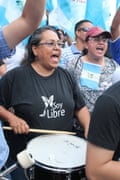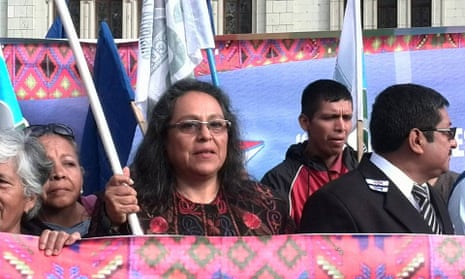Amid an extraordinary wave of people power which helped bring down a corrupt government in last year’s Guatemalan Spring, the LGBT community had its own political triumph.
Sandra Moran, 55, was elected to Congress as its first openly gay member in last September’s general election. She took office in January promising to drive forward reform to outlaw hate crimes and discrimination against the LGBT community, and sponsor a ground-breaking identity law that protects sexual diversity.
“For the first time the LGBT community feels represented in the organ of government which is meant to be representative and it has high expectations,” Moran says from her modest new office in the historic centre of Guatemala City. “There’s a long way to go but it’s an important start: Congress is still dominated by men and very conservative, but here I am.”
Moran’s ascent into mainstream politics is rooted in grassroots activism. Born in Guatemala City in 1960 – the year civil war was declared – Moran grew up in a hardworking, politically active family amid violent suppression by successive military dictatorships that targeted students, teachers, lawyers, activists and anyone else they regarded as subversive.

She joined the student’s movement aged 14. “The repression was severe, people in the social movement were being disappeared, and in 1981 I had to leave Guatemala to save my life.”
After 14 years in exile in Mexico, Nicaragua and Canada, she returned home in 1995 – a year before the peace deal ended Latin America’s longest and most brutal civil war which left at least 200,000 people, mainly ethnic Mayans, killed or “disappeared”.
Moran participated in the peace negotiations on behalf of a new women’s movement. In the same year, she co-founded the first collective of lesbian women called Mujeres Somos – We Are Women. “It was fundamentally a self-help group because we didn’t have the capacity to come out in public, but it helped us to become stronger.”
A few months later, Moran came out as a lesbian to her colleagues in the women’s movement. This set the course for her model of LGBT activism.
“I’ve never been an activist within the LGBT community. I have always fought for LGBT rights as an openly lesbian woman from within the women’s and feminist movement. I believe the struggle must take place from within the wider social movement,” she says.
It took a decade until the LGBT community was accepted as a key partner in the country’s broader fight for social justice. “I remember big protests against the free trade agreement in 2005 and men and women from the LGBT community were marching with the rainbow flag, it was such an important moment as the community was recognised part of the wider social movement.”
There are now more than 30 LGBT organisations across Guatemala. “There’s a lot still do but it’s important to recognise how much better organised the LGBT community is now.”

Nevertheless, Guatemala remains a deeply conservative and machismo society, with one of the highest murder rates in the world. Within this challenging context lesbians are raped as punishment and violent hate crimes force transgender people to flee overseas.
It is also not uncommon for female activists to be “smeared” through accusations of being lesbian on social networks and in the mainstream media.
“In Guatemala to be a feminist is not welcomed, to be a lesbian, even less so. But the fact that I have always been transparent about who I am – a lesbian feminist – took away that weapon from those who use misogynist, sexist, and homophobic attacks as a political strategy,” Moran says.
This honesty has enabled her to follow her instincts and fight for LGBT rights, without it defining her work. “It’s always be very important for me to be myself and identify who I really am. My work had helped make the LGBT community visible and I’ve contributed to organisations which put LGBT rights on the table. But I’m actually mainly known as someone who fights for the rights of women and indigenous groups.”
She adds: “I’m not sure how many people knew about my sexual orientation when they voted for me; it’s since I’ve been elected that news reports have focussed on me as the first gay woman in Congress because it’s a novelty. I hope what I do in Congress will encourage and open the way for other LGBT people to enter politics.”
In recent years there have been some notable victories for same-sex marriage campaigners in the Americas, but it is a long way off in Guatemala. The new president, Jimmy Morales, an evangelical Christian, has made his opposition clear, and it’s not a battle the Guatemalan LGBT community has so far taken to the courts. It isn’t a personal priority for Moran as she regards all marriage as a patriarchal contract.
Instead, she wants to use her four years in Congress to generate public debate about subjects still regarded as taboo in Guatemala, such as sexuality and sexual diversity, and draw attention to the homophobia and discrimination which exists. An anti-bullying campaign to help gay students istop of her to-do list as well.
“Respectful debate and discussion is necessary for the democracy of this country, to help people understand that diversity enriches the country and is not a problem,” she says.
From 8-14 February the Guardian Global Development Professionals Network is highlighting the work of the LGBT rights activists throughout the world. Join the conversation at #LGBTChange.
Join our community of development professionals and humanitarians. Follow@GuardianGDP on Twitter.

Comments (…)
Sign in or create your Guardian account to join the discussion